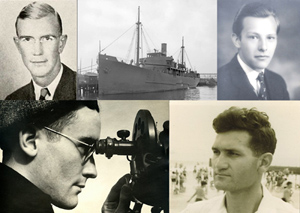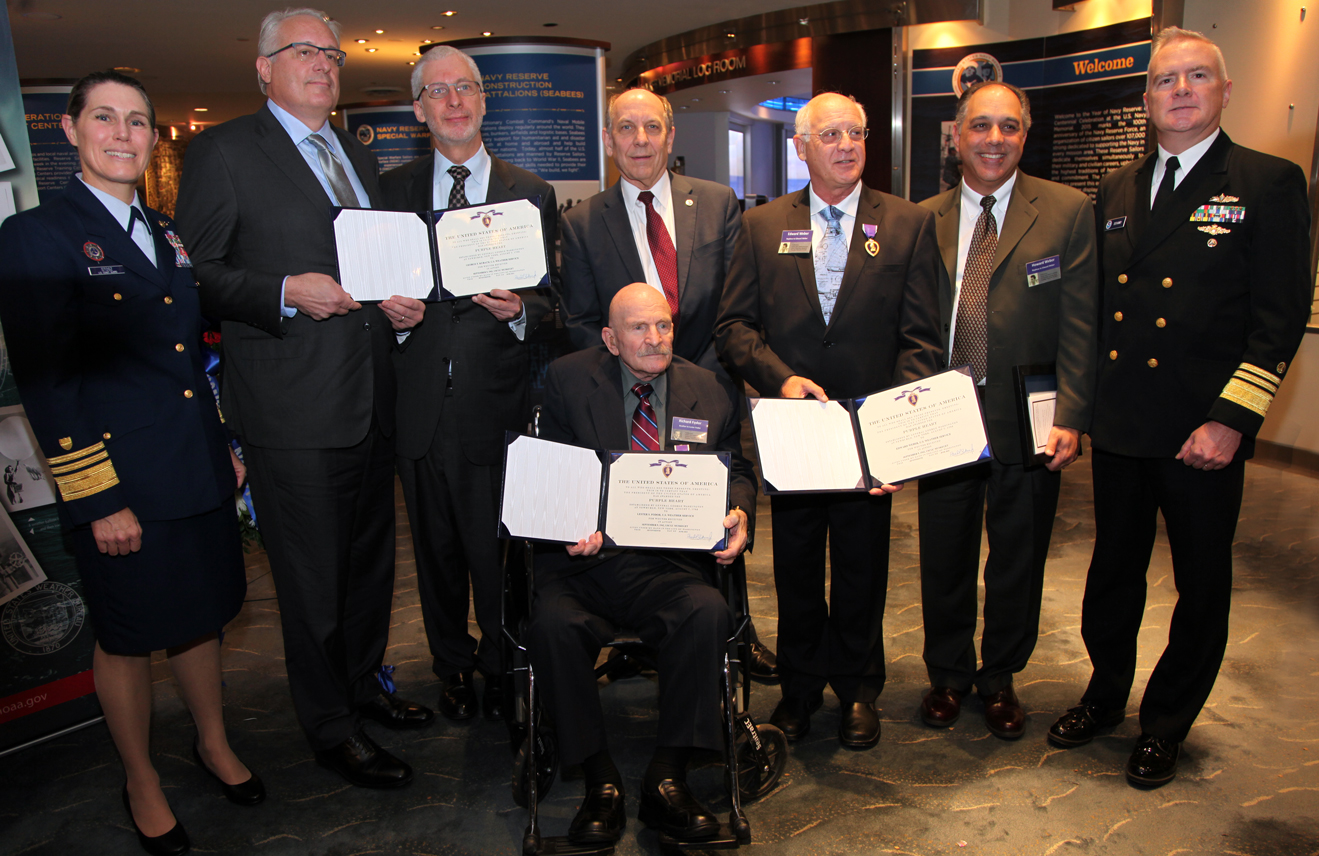Weather Bureau Meteorologists Lost at Sea - National Weather Service Heritage

Weather Bureau Meteorologists Lost at Sea
By NOAA Public Affairs OfficeWeather Bureau personnel, clockwise from top right: Lester Fodor, Edward Weber, George Kubach, Luther Brady
Lester Fodor, Luther Brady, George Kubach, and Edward Weber were not looking to make history when they volunteered in 1942 for duty as civilian weather observers aboard the U.S. Coast Guard Cutter Muskeget. Having recently completed their studies and entering the U.S. Weather Bureau, they were simply looking to do their part to serve our nation and safeguard our troops during World War II.
When, less than two months after the attack on Pearl Harbor, Weather Bureau Chief Francis Reichelderfer issued a memo inviting “applications of men who desire assignments to weather ships stationed in the Atlantic,” Fodor, Brady, Kubach, and Weber answered the call to action without hesitation, without thought of personal gain or recognition and knowing full well that in doing so they might make the ultimate sacrifice.
On the afternoon of August 24, 1942, the Muskeget departed Boston en route to Weather Station No. 2 in the North Atlantic. It would be the final voyage for the ship and its crew. After several days of sending out coded messages containing vital weather observations essential to safe navigation by vessels containing troops, fuel, munitions, and supplies, all communications from the Muskeget suddenly ceased on September 9, while it was awaiting the arrival of its relief ship, the Monomoy.
On September 11, the Monomoy reported it was unable to make contact with the Muskeget. Soon thereafter, all aircraft and ships in the vicinity began searching for the lost vessel, which had gone missing in an area known to be rife with enemy submarine activity.
The search proved fruitless and the Muskeget was presumed lost in action with no survivors. German naval records recovered after the war indicated that U-755, under the command of Kapitänleutnant Walter Göing, reported torpedoing a U.S. auxiliary merchant cruiser in the Muskeget's area of operation on September 9, 1942. It was this attack that resulted in the loss of the Muskeget and all crew members aboard.
At the time of its sinking, the Muskeget had 121 men on board: 9 commissioned officers, 107 enlisted men, one public health service officer, and four civilian employees of the U.S. Weather Bureau:
Lester Fodor, born 1915 in Cleveland, Ohio, began his service in the Weather Bureau in Cincinnati in 1938. At the time of his death, at the age of 27, he served as a weather observer.
Luther Brady, born 1914 in Atlanta, Georgia, began his service in the Weather Bureau in Savannah, in 1939. At the time of his death, at the age of 27, he served as an assistant weather observer.
George Kubach, born 1918 in Sandusky, Ohio, began his service in the Weather Bureau in Akron, in 1939. At the time of his death, at the age of 24, he served as an assistant weather observer.
Edward Weber, born 1918 in New York City, began his his service in the Weather Bureau in Boston in 1942. At the time of his death, at the age of 24, he served as a junior weather observer.
The military personnel aboard the Muskeget received the Purple Heart medal posthumously soon after the sinking, with the assumption they were killed as the result of enemy action. It was not until the discovery of the U-755 logs in 2014 that confirmed this incident, however, that the civilian weathermen became eligible for this honor.
A Purple Heart award ceremony honoring the weathermen of the Muskeget took place at the U.S. Navy Memorial in Washington, D.C., on November 19, 2015, with family members of three of the four weathermen present. It marked the first known time the Purple Heart has been awarded to a civilian member of the National Weather Service or its predecessor agencies while serving in that capacity.

Family members of three of the four weathermen honored gather with NOAA and U.S. Coast Guard leadership following the posthumous Purple Heart ceremony held at the U.S. Navy Memorial on November 19, 2015. Pictured from left to right are: Vice Admiral Sandra L. Stosz, Deputy Commandant for Mission Support, USCG; Douglas G. Kubach (nephew of George Kubach), Kevin Kubach (nephew of George Kubach), Richard Fodor (seated, brother of Lester Fodor); Louis Uccellini, Director, National Weather Service; Dr. Edward Weber (nephew and namesake of Edward Weber); Howard Weber (nephew of Edward Weber); Vice Admiral Michael S. Devany, NOAA Deputy Undersecretary for Operations.
